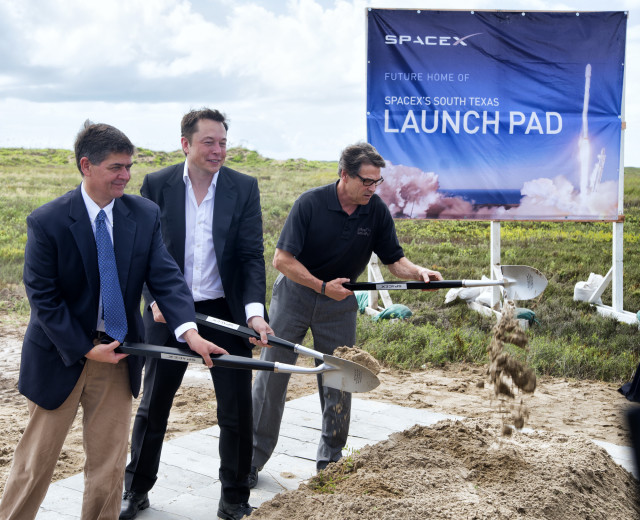Billionaires Moving in Different Orbits on Texas Space Projects

U.S. Rep. Filemon Vela, left, SpaceX founder and CEO Elon Musk, center, and Texas Gov. Rick Perry turn the first shovel-full of sand at the groundbreaking ceremony for the SpaceX launch pad at Boca Chica Beach, Monday, Sept. 22, 2014. AP Photo/Valley Morning Star, David Pike
By Elizabeth Williams
For Reporting Texas
A barren South Texas beach could become the launch site for rockets carrying commercial satellites by late 2016, boosting the economy of the Brownsville area and Texas’ ambitions to become a major hub of the private space industry.
SpaceX, set up by PayPal founder and Tesla Motors CEO Elon Musk, broke ground for the $100 million spaceport on Sept. 22. Musk shoveled dirt alongside Gov. Rick Perry. State programs gave the company $15.3 million in incentives.
While construction has not started, local officials are excited about what the spaceport may do for the region, including the prospect of creating hundreds of high-paying jobs within the next 10 years for one of the poorest areas of the state.
SpaceX may represent the changing tide of the space industry. Texas has played an instrumental part in space exploration since the Lyndon B. Johnson Space Center was built in Houston in 1961. NASA shifted to research and exploration after space shuttle flights ended in 2011, while entrepreneurs began pursuing private space travel. Musk’s ultimate goal is to colonize Mars.
Blue Origin, a private aerospace firm backed by Amazon.com founder Jeff Bezos, also has a facility in Texas. In 2006 the company built a rocket-testing facility in the West Texas desert.
But SpaceX and Blue Origin operate in very different ways.
While SpaceX seems poised for liftoff in South Texas, Blue Origin’s progress is a mystery to many residents of Van Horn, the closest town to the 290,000 acres that Bezos bought in 2005.
Musk has promised to recruit locally for some of the new SpaceX jobs. He’s kicking in an estimated $14 million for a new space communications research center at the University of Texas of the Rio Grande Valley. He’s won about $20 million in incentives from state and local governments, including $13 million from the state’s Spaceport Trust Fund and $2.3 million from the Texas Enterprise Fund.
State Rep. Rene Oliveira, a Democrat who represents the Brownsville area, said the investment will pay off. “The SpaceX payroll will be a substantial boost and create hundreds of spinoff jobs as well,” he said in an email.
Bezos is financing his space ventures himself. He keeps his project shrouded in secrecy, said Robert Morales, editor of Van Horn Advocate, the local newspaper. Employees must sign agreements not to talk about what goes on there. When Bezos comes to town, he doesn’t mingle with the community, Morales said.
“We would just simply like to see some kind of community involvement with Mr. Bezos,” Morales said. “I know that he comes here fairly often and he lands at our airport but there never seems to be any kind of interaction with this town.”
Morales said that Bezos’ secrecy makes it difficult for the town to feel any connection to the company.
“It would be nice if he gave a little money to the schools, maybe for a science program,” Morales said. “He would be so incredibly liked and respected for doing that. Those are the kinds of things I would like to see, and I think a lot of others would like to see, but he’s just kind of absent.”
Blue Origin said no one from the company would comment for this article. SpaceX did not respond to requests for comment.
Rick Tumlinson, a Houston entrepreneur and advocate for the private space industry, said there’s a reason for the difference between Musk and Bezos’ space pursuits.
“SpaceX is Elon Musk’s passion and goal in life,” he said. “Blue Origin is one of the things Jeff Bezos is doing.”
The next step involves creating a supportive infrastructure for space companies to flourish.
“What’s really important in the long run is not that we have two or three big guys here,” Tumlinson said. “It’s that there’s an ecosystem or economy that gets created and includes the smaller companies.”
Carlos Cascos, the Cameron County judge, said the SpaceX project will permanently change the economic and educational landscape of Cameron County and the Rio Grande Valley.
“We have people already excited about developing and wanting to stay here for aerospace engineering, which was never thought of two years ago,” Cascos said. “It’s planting the seed and growing the seed where there was once nothing.”